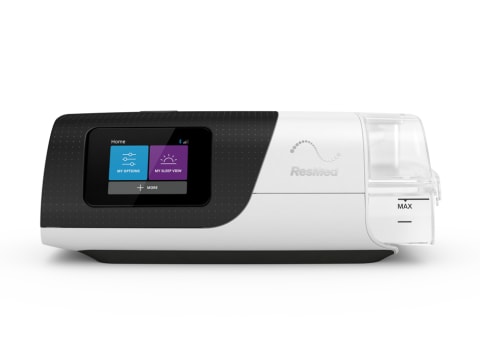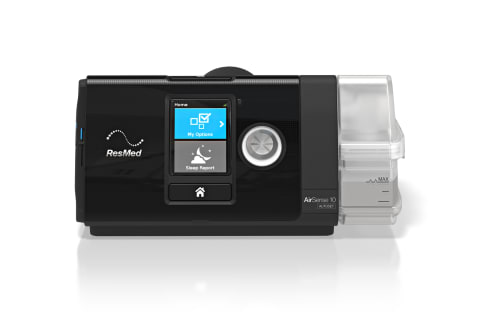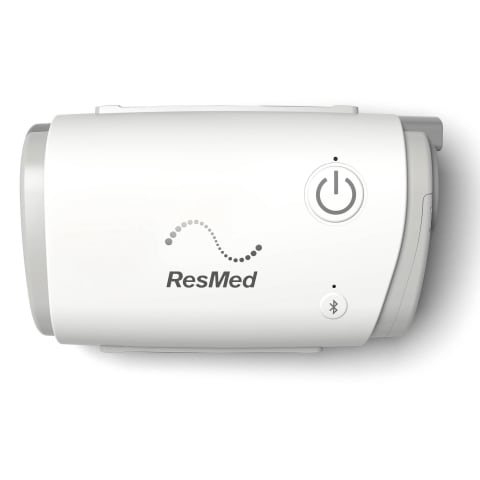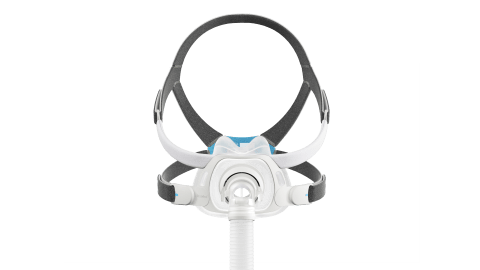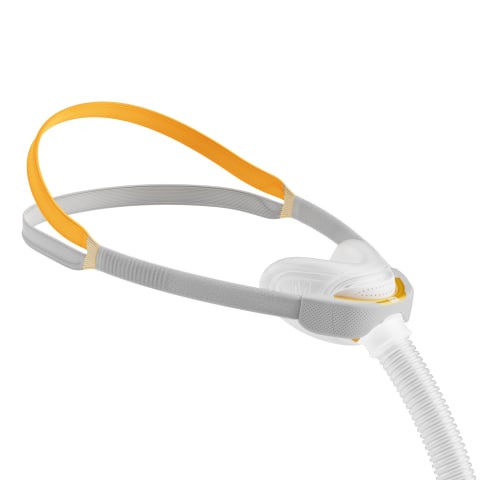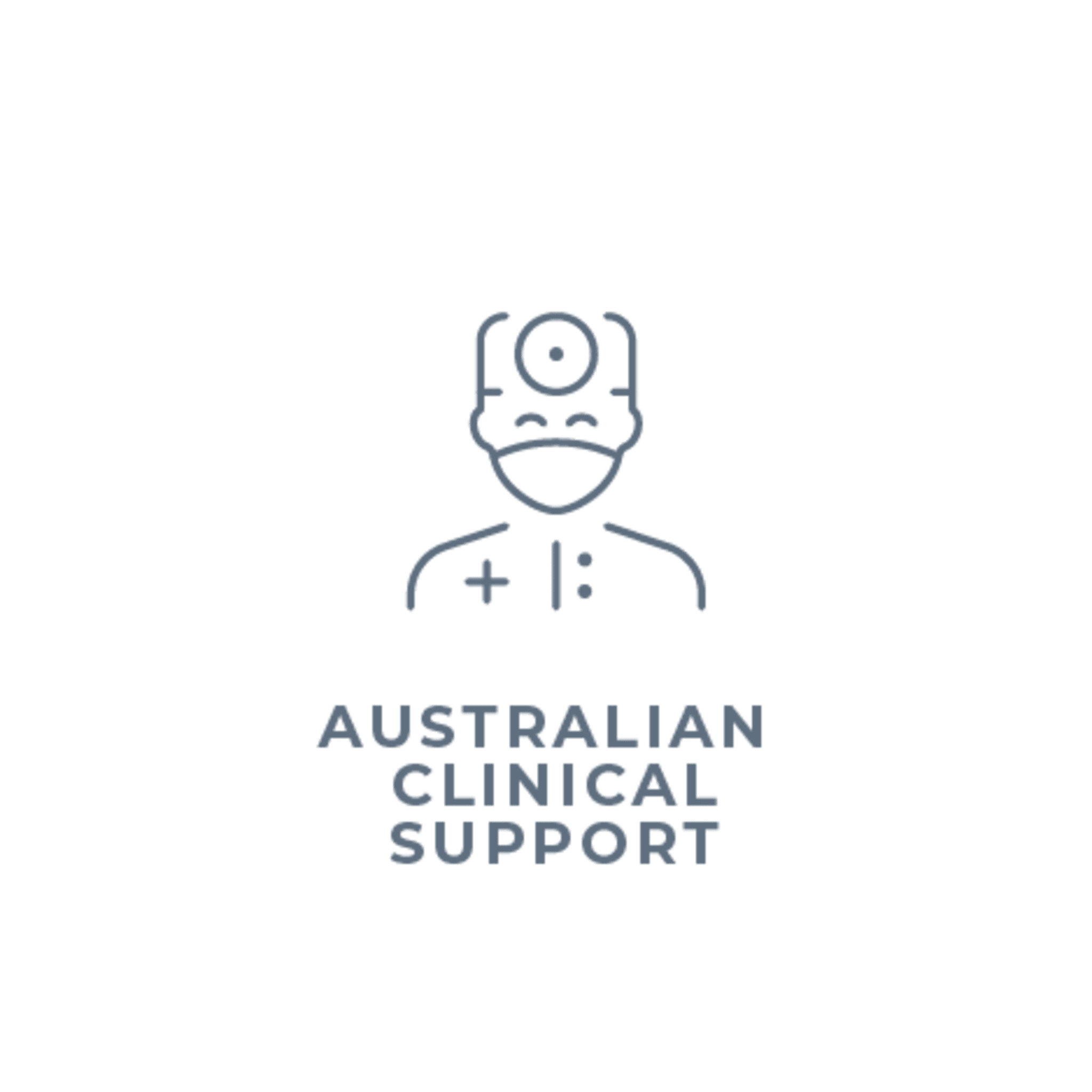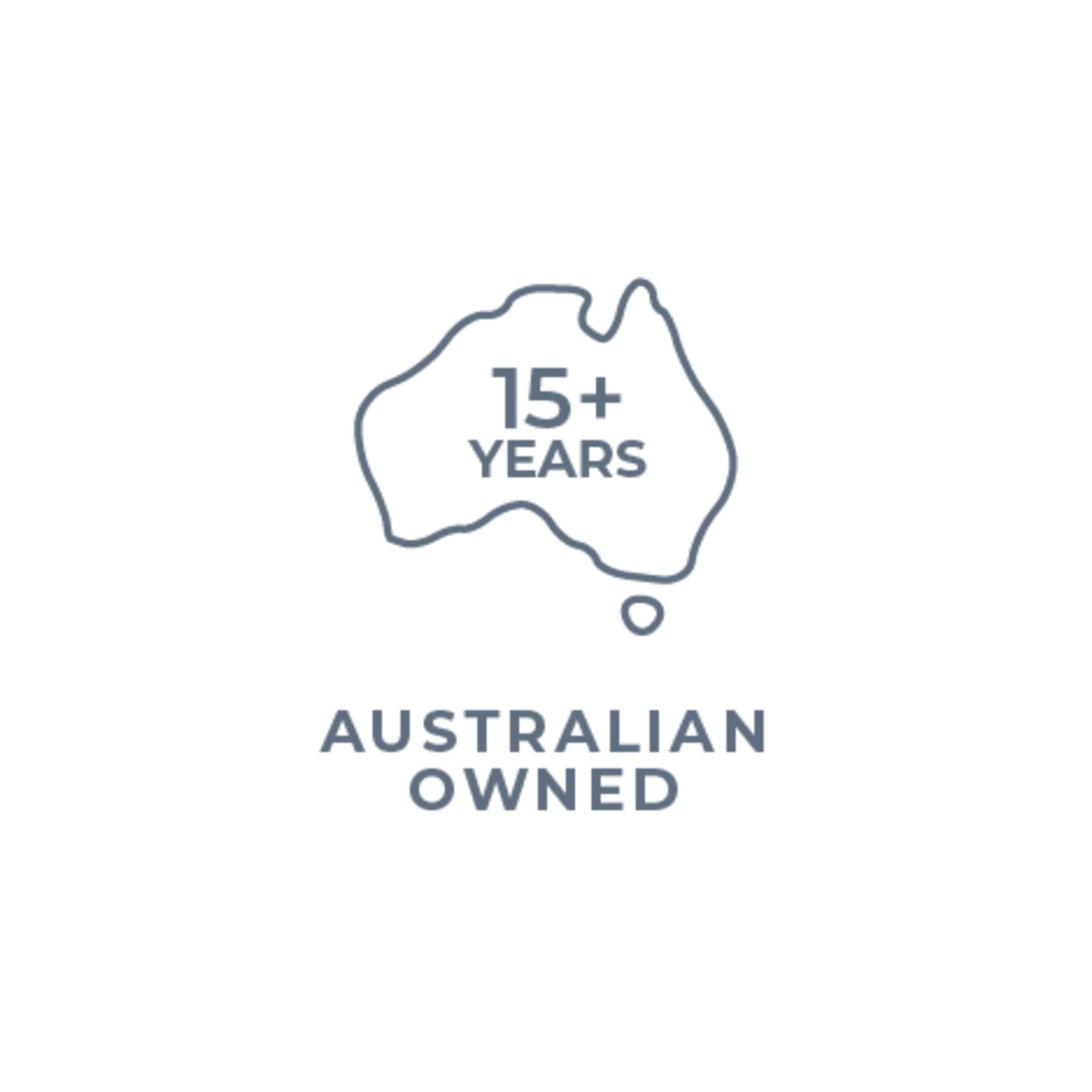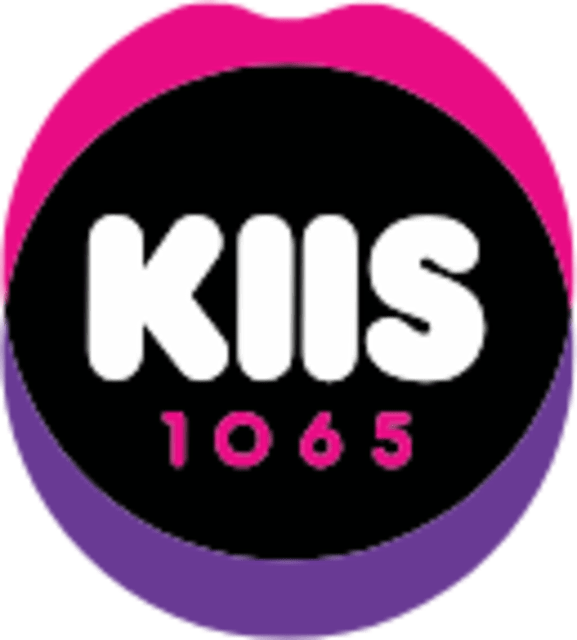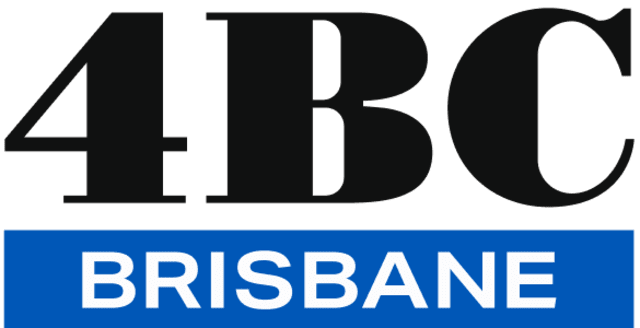Popular Products
Frequently Asked Questions
What are the different types of CPAP machines available?

There are three main types of CPAP machines used to treat sleep apnea: Fixed CPAP, APAP and BiPAP.
A fixed pressure CPAP machine delivers a single, fixed level of air pressure to keep your airway open during sleep. It’s the most common option for people with obstructive sleep apnea (OSA).
APAP machines, on the other hand, automatically adjust the pressure based on your breathing throughout the night. This makes them ideal for people whose pressure needs change as they sleep.
Finally, BiPAP machines provide two pressure levels, a higher one for inhaling and a lower one for exhaling, which is often recommended for people with more complex needs or central sleep apnea.
When it comes to trusted CPAP brands, ResMed, Philips Respironics, and Fisher & Paykel Healthcare are among the most widely recommended. Each offers a range of machines tailored to different therapy needs. Your sleep specialist will typically guide you in selecting the right type of machine during your diagnosis and therapy planning.
Is there a difference between CPAP, APAP and BiPAP machines?

Yes – while all three types deliver positive airway pressure to treat sleep apnea, the way they deliver that pressure varies, and this can make a big difference to your comfort and how well you adapt to therapy.
A fixed pressure CPAP machine delivers a steady stream of air at a fixed pressure. This can be very effective, but some people may find the constant pressure hard to tolerate, especially during exhalation.
APAP machines are more responsive. They use sensors to automatically increase or decrease the pressure depending on your breathing patterns. This makes them a popular option for those with variable sleep conditions or who find fixed pressure uncomfortable.
BiPAP machines are more advanced. They offer two distinct pressure settings, which can make breathing feel easier, particularly for people with high pressure needs or central sleep apnea.
If you’re not sure what’s right for you, a sleep physician can help by reviewing your sleep study results and recommending the most suitable machine.
What features should I look for in a CPAP machine?

When choosing a CPAP machine, it’s worth looking beyond the pressure setting alone. Comfort, convenience and ease of use all play a big role in long-term success with therapy. Here are the key features to keep in mind:
Comfort-enhancing features: Many machines come with a built-in humidifier to add moisture to the air, which helps reduce dryness in the nose, throat or mouth – especially useful in colder or drier climates. Heated tubing is another helpful addition, as it prevents condensation (known as "rainout") from forming in the hose and disrupting therapy.
Quiet operation: A quiet motor can make a big difference to both you and your partner. Devices like the ResMed AirSense 11 and F&P SleepStyle are designed with low-noise technology to create a more peaceful sleep environment.
Therapy tracking and digital support: If you're someone who likes to track your progress, look for a machine that connects to a mobile app. The ResMed AirSense 11, for example, links to the myAir™ app, which provides personalised sleep reports, coaching tips and progress tracking. Philips and Fisher & Paykel offer similar connectivity through their own platforms.
User-friendly design: Simple controls, clear displays and intuitive menus can make therapy far less daunting – especially when you’re new to it. Many modern machines include automatic start/stop functions and are built with easy-to-clean components, which makes daily maintenance quicker and more manageable.
Mask compatibility: Most machines are compatible with a wide range of masks, but it’s always worth confirming – particularly if you already have a mask you like. Whether you prefer a full face, nasal or nasal pillow mask, choosing a trusted brand like ResMed, Philips Respironics or Fisher & Paykel helps ensure your mask will fit and perform well.
Portability and travel options: If you travel frequently or spend time off-grid, you might consider a more compact device. Models like the ResMed AirMini or Philips DreamStation Go are lightweight and portable, with optional travel batteries and accessories that make them ideal for life on the go.
At the end of the day, the best CPAP machine is one that fits your lifestyle and helps make therapy something you can stick with, night after night.
How do I choose the right CPAP machine for my needs?

The best place to begin is with a proper diagnosis and prescription from a qualified sleep physician. If you’re experiencing symptoms like loud snoring, excessive daytime tiredness or frequent waking during the night, your doctor may recommend a sleep study. This can be done either in a sleep lab or at home, depending on your circumstances. The results will help determine the type and severity of your sleep apnea and whether you require a CPAP, APAP or BiPAP machine, along with your ideal pressure settings.
Once you have your prescription in hand, it’s time to think about your individual needs and preferences. Choosing the right CPAP machine is about more than just the medical side – it’s also about comfort, convenience and lifestyle.
Do you travel often? Look for a compact, lightweight machine like the ResMed AirMini. These models are designed for portability and often come with optional travel cases, slim tubing and battery packs.
Prone to dryness or congestion? A machine with a built-in humidifier can add moisture to the air and reduce irritation. Heated tubing also helps prevent condensation in cooler environments.
New to CPAP therapy? Choose a machine with a simple interface, clear display and auto start/stop. Some devices offer guided setup and app-based support to help you get started with confidence.
Want to track your progress? Many machines connect to apps like ResMed’s myAir, offering nightly sleep scores, mask fit feedback and usage trends – great for staying on track and sharing data with your doctor.
Already have a favourite mask? Make sure your machine is mask compatible. Leading brands like ResMed, Philips Respironics and Fisher & Paykel support most full face, nasal and nasal pillow masks.
Looking for low maintenance? Opt for a device with easy-to-clean parts and smart reminders for filter changes or low water levels to keep therapy hassle-free.
Do CPAP suppliers offer trial periods for machines?

Yes, and if you're just starting out, a CPAP trial can be one of the best ways to ease into therapy with confidence.
At Sove CPAP Clinic, we offer a comprehensive 4-week CPAP trial package for just $100. This includes a premium automatic PAP (APAP) machine along with all the essential accessories: a heated tube, power supply, filters, and carry bag.
During your trial, you’ll have weekly face-to-face consultations with our experienced CPAP Consultants, as well as access to phone and telehealth support from Monday to Saturday. We’ll monitor your results, help you test different masks, and make personalised adjustments to ensure your therapy is both comfortable and effective. And if any issues arise, respiratory and sleep specialist support is also available.
To find out more or arrange your CPAP trial, get in touch with our team at 1300 76 29 39.
Can I return or exchange my CPAP machine if it doesn’t suit me?

Yes – at Sove CPAP Clinic, we understand that finding the right fit is a deeply personal experience. That’s why we offer a 30-day money-back guarantee on a wide selection of our most popular CPAP masks and machines. This policy is designed to give you the confidence to try something new, knowing you're not locked into a product that might not feel right.
This flexible return window allows you to test out a new mask or machine in your own home – not just for a night or two, but over several nights, which is often what it takes to know whether something truly suits your comfort level, sleep position and breathing style.
If it turns out the device isn’t quite right for you, you can return or exchange it within 30 days of purchase. We simply ask that the item is returned in good condition with all original packaging and components. Whether you're switching to a different model, trying a new mask style or just looking for a better fit, our team is here to help you find the right match.
Not sure whether the product you’re considering is covered under the return policy? Just give us a call or pop into one of our clinics. Our friendly staff will walk you through the eligible options and answer any questions you may have – so you can breathe easy knowing you’ve got support every step of the way.
Are CPAP machines covered under Medicare in Australia?

Medicare itself doesn’t directly cover the cost of CPAP machines for most people, but you may still be able to access support depending on your circumstances.
For example, public hospitals sometimes offer equipment loans or rental programs. You may also be eligible for funding through private health insurance (depending on your extras cover), the NDIS if you have a disability, or the Department of Veterans' Affairs (DVA) if you’re a veteran.
Medicare does, however, typically cover sleep studies and specialist consultations, which are essential for getting your sleep apnea diagnosis. Your provider or sleep clinic can help you navigate what support you qualify for.
How do I travel with a CPAP machine?

Travelling with a CPAP machine has become much easier in recent years thanks to smaller, lighter models and accessories designed with portability in mind. Whether you're heading away for a weekend or flying overseas, a bit of preparation will help keep your sleep therapy on track while you're on the go.
Most modern CPAP machines – including popular models from ResMed, Philips Respironics and Fisher & Paykel – are approved for carry-on luggage and can be brought on board flights without counting toward your baggage limit. You may want to carry a copy of your prescription or a note from your doctor just in case airline staff request documentation, though this is rarely required. If you plan to use your machine during a flight, be sure to check with the airline in advance, as some require prior approval and access to an in-seat power source.
For convenience, many people opt for a travel-specific machine such as the ResMed AirMini. Travel devices are not only easier to pack but are also compatible with optional travel cases, slimline tubing and portable battery packs. They're ideal if you're camping, going off-grid or simply trying to travel light.
If you're heading somewhere without guaranteed power – like a remote location, caravan trip or long-haul flight – consider investing in a CPAP battery pack or DC power converter that works with your machine.
Don't forget to pack the essentials:
- Your mask and tubing
- Any cleaning wipes or travel-sized equipment cleaner
- Spare filters (especially if you’re going somewhere dusty or humid)
- A universal power adapter if travelling internationally (most CPAPs are dual-voltage, but the plug shape will vary)
It’s also a good idea to pack your CPAP machine in a protective case to avoid damage in transit, even if you're carrying it on board.
Where can I get support if I’m struggling with CPAP therapy?

It’s completely normal to face a few bumps in the road when starting CPAP therapy – you’re not alone. Whether it’s discomfort, mask leaks, trouble adjusting to the pressure or simply not feeling rested despite using your device nightly, the most important thing is to know that help is available.
At Sove CPAP Clinic, we offer end-to-end support to guide you through every stage of your therapy. Our experienced CPAP Consultants can troubleshoot common issues like poor mask fit, dryness, noise, or device settings. If you’re still feeling tired or not seeing results, our Sleep Physicians can review your sleep data and recommend clinical adjustments or further testing if needed.
Modern machines collect detailed therapy data – including metrics like your Apnea-Hypopnea Index (AHI), leak rate and usage time. If something feels off, we can help interpret those results and tailor a solution that works for you.
And because we know support shouldn’t stop after purchase, we offer follow-up care, regular reviews and personalised advice to help you stay on track for long-term success. Just reach out – our team is here for you.
What support is available for CPAP users in Australia?

At Sove CPAP Clinic, we believe the key to successful CPAP therapy isn’t just the device – it’s having the right team by your side.
With over 60 locations nationwide and an integrated team of Sleep Physicians and CPAP Consultants, we offer comprehensive support that’s available in-clinic or via telehealth, depending on what suits you best. From your initial sleep study and diagnosis, through to ongoing therapy and progress reviews, our team is with you every step of the way.
We provide:
- Expert mask fittings and comfort adjustments
- Assistance with device setup, pressure settings and usage tips
- Ongoing support for equipment issues, warranty claims and replacements
- Regular follow-ups and therapy monitoring to ensure your treatment stays effective
- Telehealth appointments with sleep specialists, accessible from home
As a truly independent provider, we also offer a wide range of masks and machines from all leading brands – without bias – to ensure you get the right fit for your needs.
Whether you’re just starting or need a fresh approach, help is always close by. Give us a call on 1300 76 29 39, book online or drop by your nearest clinic to speak with our

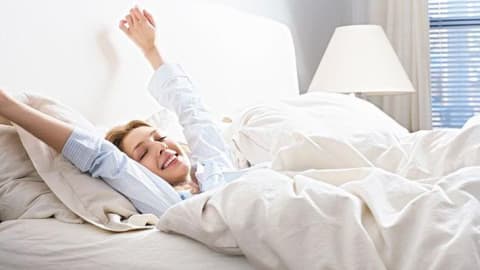
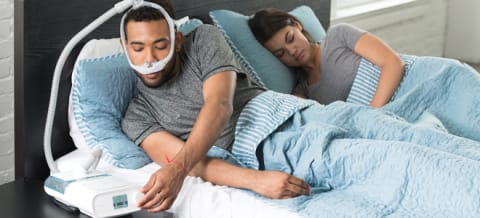
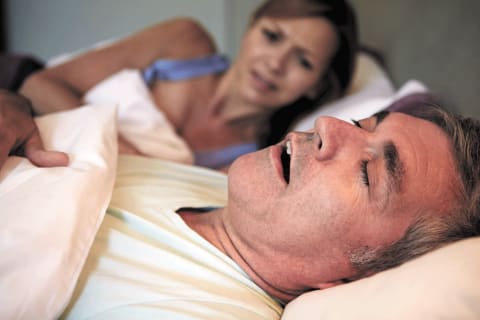
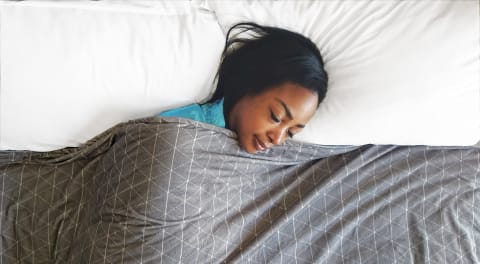


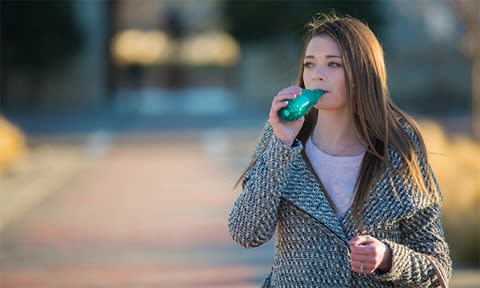
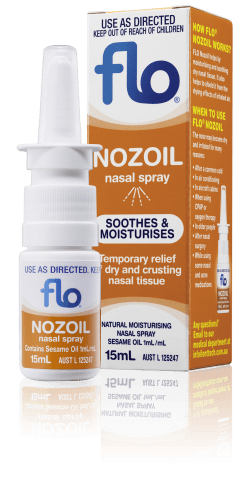

![[HOMEPAGE] - Buy a CPAP Machine (Button)](https://res.cloudinary.com/hdgrv2tqh/image/upload/c_fit,f_auto,h_2048,w_2048/v1/media/buy_cpap_machines.png)
![[HOMEPAGE] - Buy a CPAP Mask (Button)](https://res.cloudinary.com/hdgrv2tqh/image/upload/c_fit,f_auto,h_2048,w_2048/v1/media/buy_cpap_masks.png)
![[HOMEPAGE] - Bulk Billed Sleep Studies (Button)](https://res.cloudinary.com/hdgrv2tqh/image/upload/c_fit,f_auto,h_2048,w_2048/v1/media/bulk_billed_sleep_studies.png)
![[HOMEPAGE] - See a Sleep Specialist (Button)](https://res.cloudinary.com/hdgrv2tqh/image/upload/c_fit,f_auto,h_2048,w_2048/v1/media/see_a_sleep_specialist.png)
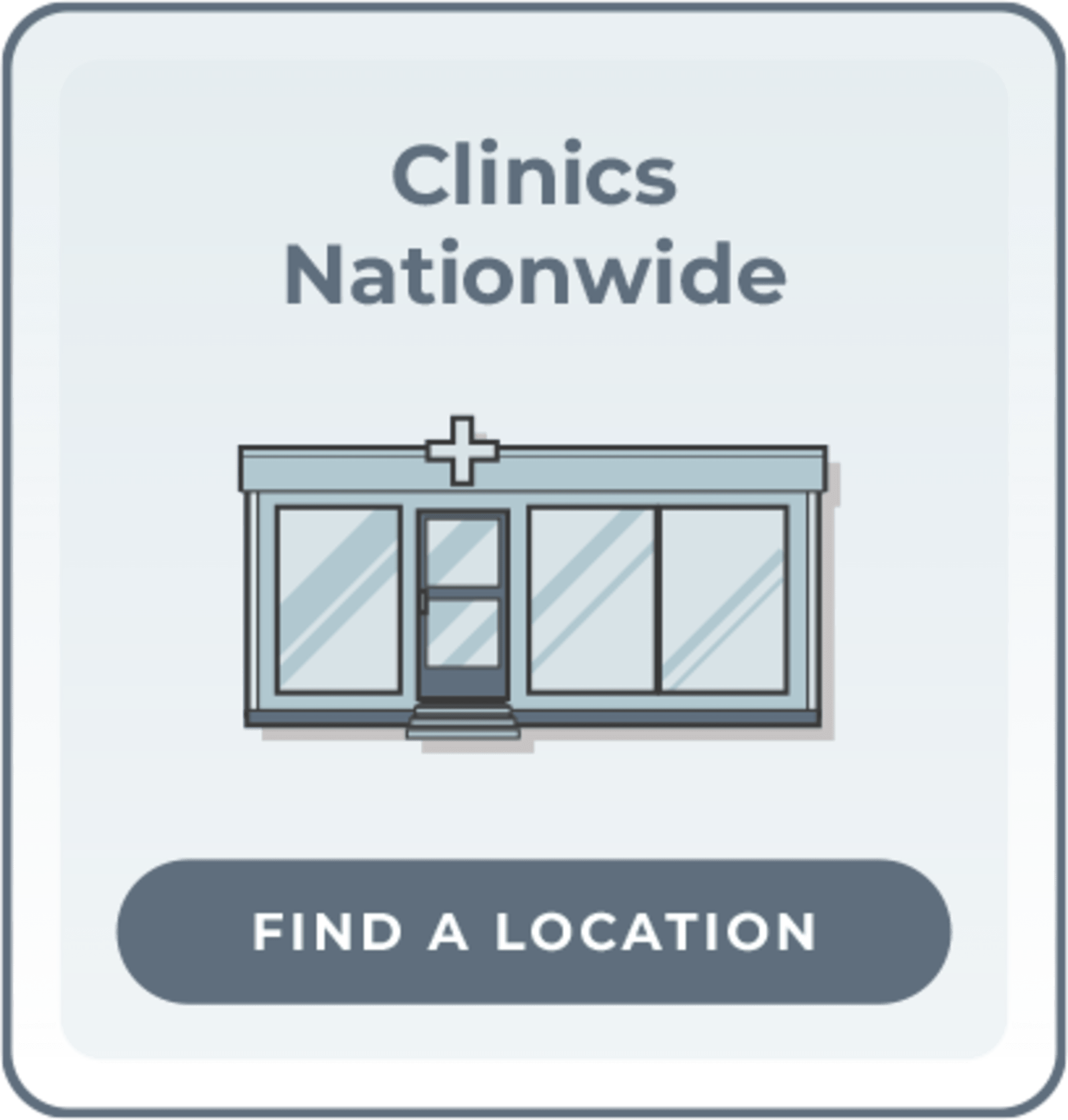
![[Homepage] - Payment Plan Banner](https://res.cloudinary.com/hdgrv2tqh/image/upload/c_fit,f_auto,h_2048,w_2048/v1/media/cpap-payment-plans.png)





